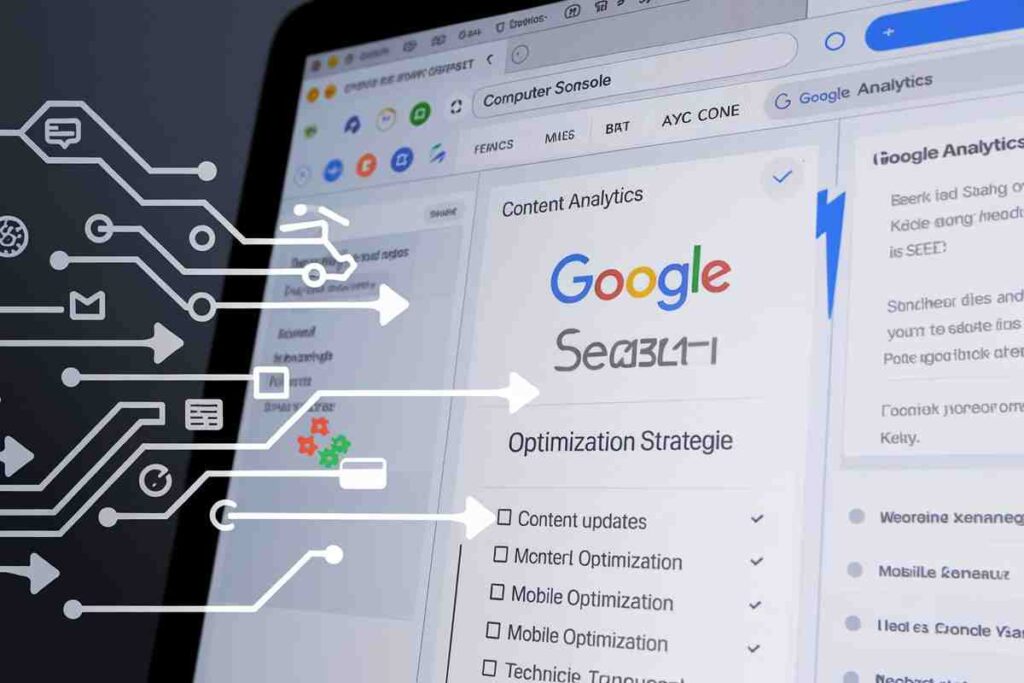Google update frequency SEO plays a pivotal role in determining how websites perform in search rankings. With frequent algorithm updates, Google ensures that its search results remain relevant, user-focused, and aligned with evolving technology.
These updates influence how content is indexed, ranked, and displayed, making it crucial for website owners and SEO professionals to stay informed and adaptable.
In this blog, we’ll dive deep into what Google’s update frequency means, how often these changes occur, and actionable strategies to optimize your website for consistent visibility and traffic.
What Is Google Update Frequency in SEO?

Google updates its search algorithm constantly, making SEO an ever-evolving challenge. These updates can range from minor adjustments to major core updates that shake up rankings across industries.
Staying informed on Google update frequency SEO helps website owners adapt quickly and maintain their rankings.
How Often Does Google Update Its Algorithm?
Google makes thousands of updates each year—most of them are subtle and go unnoticed. However, major updates, such as those targeting spam or introducing new ranking factors, are announced publicly.
For instance:
- Core Updates: These occur a few times a year and bring significant changes.
- Spam Updates: Target low-quality or malicious content and can occur multiple times annually.
- Product Reviews Updates: Focus on improving the ranking of high-quality review content.
These frequent updates underline the importance of tracking changes using tools like Google Search Console and Google Analytics to measure their impact on your website.
How Long Does It Take for Google to Update Search Results?
Search result updates can vary based on the type of changes you make:
- Small Updates (e.g., Metadata Changes): Reflected in days to a week.
- Major Overhauls (e.g., Content Revamp): Could take weeks or even months for Google to fully reflect the updates.
Using tools like Google Search Console, you can track indexing progress and identify potential issues slowing the process.
Why Does Google Update Its Algorithm So Frequently?
Google’s mission is to deliver the best possible search experience for its users. Frequent updates ensure:
- Relevance: Content stays current and matches user intent.
- Quality: Spammy or low-quality content is penalized.
- Technology Advancement: Accommodates changes like AI and machine learning in search.
For businesses, adapting to these updates is crucial to stay competitive. By leveraging SEO tools and staying updated with industry news, you can ensure your site complies with Google’s guidelines.
How to Optimize for Google Update Frequency SEO

Monitor Updates Using Tools
Google offers several tools to help website owners understand their site’s performance.
- Google Search Console: Tracks indexing issues, search traffic, and performance metrics.
- Google Analytics: Monitors user behavior, traffic sources, and goal conversions.
By combining these tools, you can identify dips in traffic caused by algorithm changes and take corrective action.
Focus on Content Quality
High-quality content remains the foundation of good SEO.
- E-A-T Principles: Expertise, Authority, and Trustworthiness are crucial.
- Regularly update older content to ensure relevance.
- Incorporate multimedia elements like videos and infographics to enhance engagement.
Enhance Technical SEO
Google frequently updates its algorithm to prioritize speed and user experience. Key areas to focus on:
- Mobile-Friendly Design: A must for better rankings.
- Page Speed: Compress images and use caching to improve load times.
- Structured Data: Helps Google understand your content better.
Stay Informed About Industry Trends
Subscribe to reliable sources like Search Engine Journal, Moz, and Google Webmaster Blog to stay informed about updates.
How Often Does Google Update Street View?
Though unrelated to SEO, Google also updates its Street View imagery periodically, depending on the region and user demand for accurate navigation data.
Urban areas might see updates every year, while rural locations may take several years. This consistency in updates reflects Google’s dedication to providing accurate, up-to-date information across its platforms.
What to Do When a Google Update Affects Your Rankings
Step 1: Assess the Impact
Using Google Analytics and Google Search Console, identify the drop in traffic or rankings. Check which pages are affected and analyze the potential causes.
Step 2: Update Content
Align your content with the latest guidelines. Add value by addressing user queries, improving readability, and updating outdated information.
Step 3: Audit Your Site
Conduct a full SEO audit to identify technical issues, broken links, or duplicate content. Fixing these can help recover lost rankings.
Step 4: Monitor Recovery
Keep a close eye on performance metrics to gauge the effectiveness of your changes. Improvements might take weeks or months to reflect fully.
Future Trends in Google Update Frequency SEO

Looking ahead, Google’s focus will likely remain on user experience and intent-driven search. Key areas of growth include:
- AI Integration: Tools like Google Bard and advances in AI will play a larger role in shaping search.
- Voice Search Optimization: With increasing adoption, optimizing for voice search queries will be vital.
- Enhanced Core Web Vitals: Google’s focus on page experience metrics will continue to grow.
By staying proactive and adapting quickly, businesses can navigate these changes effectively.
Conclusion
Google update frequency SEO is a dynamic challenge that requires constant vigilance, adaptability, and a proactive approach to stay ahead in competitive rankings.
By understanding how often Google updates its algorithms, leveraging tools like Google Search Console, and prioritizing high-quality content, you can maintain strong rankings even in a competitive landscape.
Stay updated, stay proactive, and your website will thrive despite Google’s frequent algorithm changes.
FAQs
How often does Google update its algorithm?
Google updates its algorithm daily, with major updates occurring a few times annually.
What is the impact of Google’s core updates?
Core updates can significantly affect search rankings, emphasizing content quality and relevance.
How can I track Google algorithm updates?
Use tools like Google Search Console and stay informed via industry blogs like Search Engine Journal.
Does Google notify about all updates?
No, Google only announces major updates, while smaller tweaks happen unnoticed.
How long does it take to see ranking changes after updates?
It can take days to weeks, depending on the scale of the changes.
Are Google Street View updates related to SEO?
No, but they showcase Google’s commitment to regularly updating its services.
What tools can help with SEO after an update?
Google Analytics and SEO tools like SEMrush or Ahrefs can identify performance changes.
How should I respond to a drop in rankings?
Analyze the issue, update content, fix technical errors, and monitor recovery progress.

